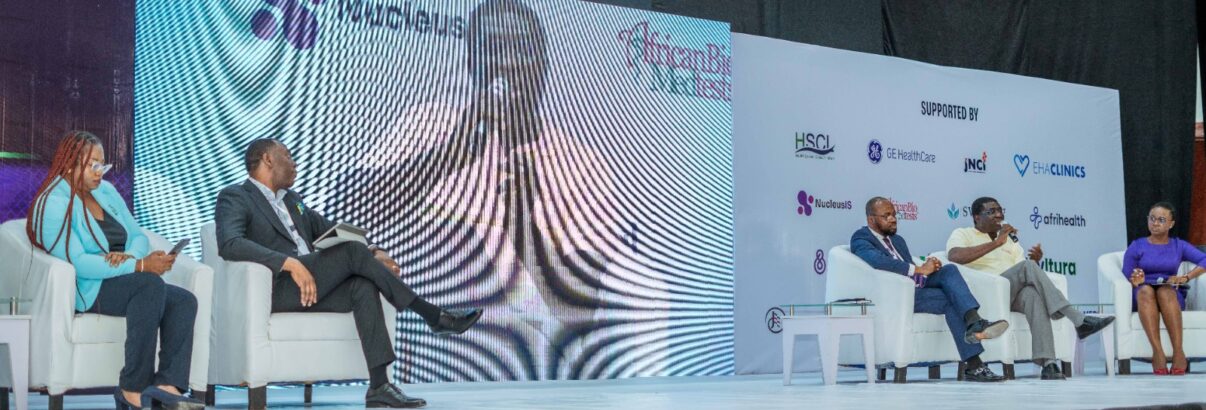During the first panel session of the Lagos Health Summit 4th edition, experts across the pharmaceutical, medical diagnostic, medical technology and health law organisations were brought together to discuss “Impact of local production of medical equipment and materials” through strengthening of the healthcare supply chain.
According to the experts, it was established that “local production is needed for a sovereign economy. However in Nigeria, we are far from where we should be in the local production of medical materials and diagnostic equipment, and we are not even manufacturing any medical equipment despite available resources”. Hence, we must intentionally invest in “proudly Nigerian” products to reverse the massive importation into Nigeria from other countries, Mr Voke Oshevire (Executive Director, JNCInternational Limited, Lagos) urged.
To establish local production across the nation, steps highlighted include: protection of Intellectual Property of local manufacturers, encouraging technology knowledge transfer to local organization manufacturers, adopting harmonized processes for production and aligning ourselves with the international standards of manufacturing.
Although, stringent regulatory authority is needed across Africa, so we can measure up to the drug efficiency of international standard and bridge the gap between our locally and internationally produced drugs, Dr Uduku (General Manager, GE Healthcare West Africa) emphasised. Albeit Prof Onyemelukwe (Managing Partner, Health Ethics and Law Consulting – HELC) in response to this stated that, the African Union Model Law on Medical Products Regulation and Harmonisation already exists. But sadly, “only 13 countries in Africa have signed up the harmonised document created in 2016 for quality of medicine, and Nigeria isn’t one of them”. Further explaining that this is needed to create more awareness and build trust among the public on the efficacy and effectiveness of the Nigerian-made brands.
Some other listed criteria and factors to be considered for local manufacturing of medicines and medical equipment include: robust research and development plan, availability of needed infrastructure, market knowledge, cultural preference and nuances, networking and partnerships within and outside the health space.
Expatiating on setting up and running medical diagnostics locally, Prof Imumorin (Cofounder/CEO, AfricanBio Medical Tests Ltd – AMT) assured that the logistics aspect is the easy part. However, regularly getting the samples (bloody and bodily fluids with other tissues) to be tested – with their reagents, in good shape and timing – is usually the greatest challenge. Therefore, an optimised supply chain and collaboration for sample testing across local medical diagnostics can be leveraged to assist them in scaling the number of samples tested effectively. For example, diagnostic centres can subspecialize in testing and pool resources to work on similar samples per time.
Beyond the challenges in our healthcare system and how restricted our medical services are, Prof Onyemelukwe implored healthcare providers to look past “self-interest” and profit but focus on achieving a “win-win situation” for the greater good of the nation. She cited our experience during the COVID-19 pandemic, recounting what was and could be achieved when – as a country- we look after our own citizens and pay attention to “our own” self-interest.
In addition, she pointed out that “beyond having discussion surrounding these issues, it’s time we did something different. We need to take these conversations to the appropriate authorities, revisit policies and revise them when needed. Because we can’t want to incentivise local production of drugs and vaccines, but other existing policies contradict this process (e.g., high taxation of raw materials needed for production etc)”.
In conclusion, Prof Imumorin reiterated that “we’re at a critical point where collaboration, partnership and sensitization are needed. And regardless of our challenges and current state of things in the healthcare system and country as a whole, there’s hope”.
Editor’s note:
This article was collated by Dr Hikmat Maiyegun and Dr Mary Agoyi following their physical and virtual attendance (respectively) at the Lagos Health Summit 4.0.





Discussion1 Comment
Pingback: We are Committed to Balancing the Local Production and Importation of Essential Maternal Health Products in Nigeria… ~ NAFDAC Representative, 4th SHI Maternal Health Summit